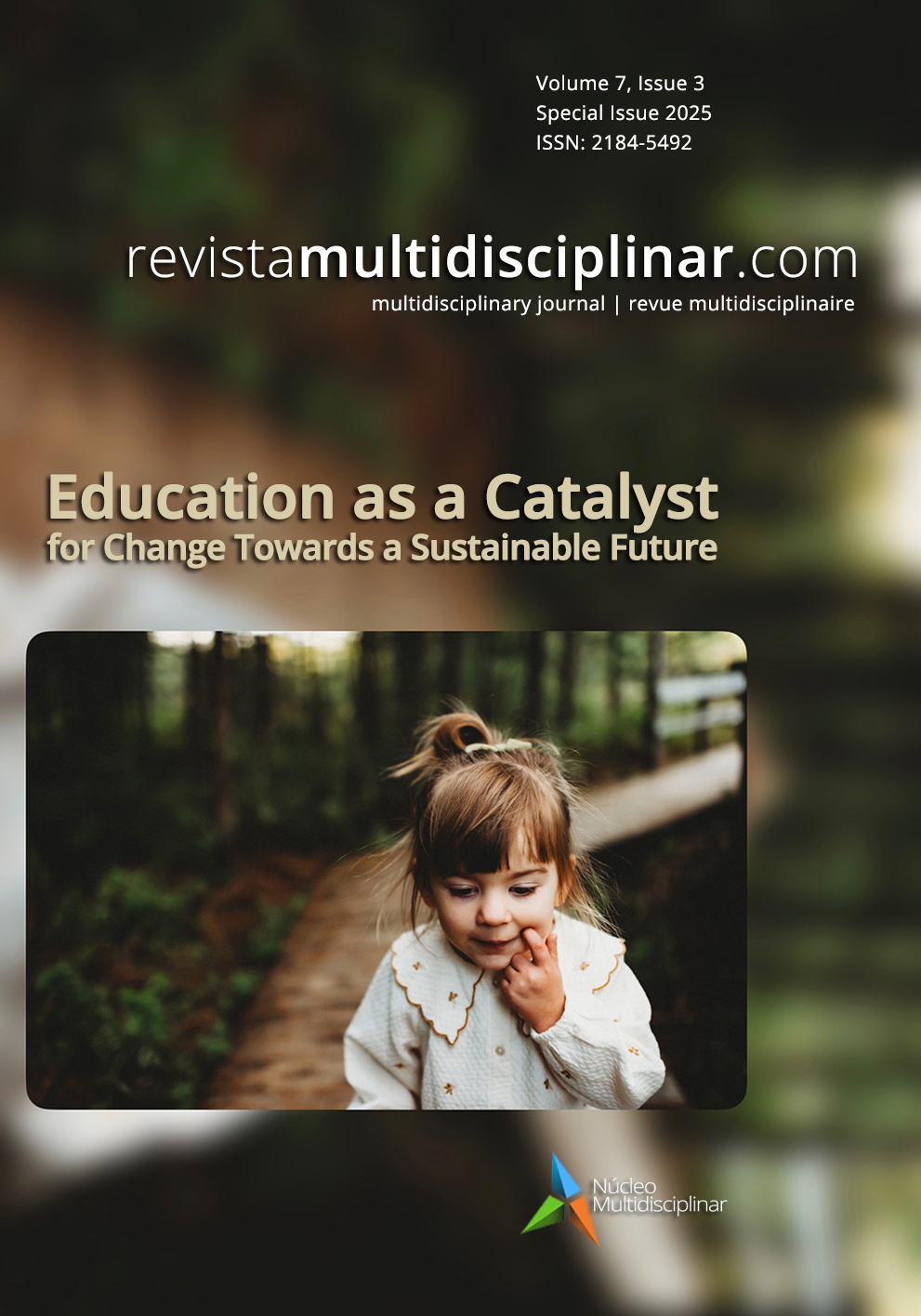Advancing Scientific Literacy in Climate Change Education through Collaborative
Evidence-Based Approaches
DOI:
https://doi.org/10.23882/rmd.25295Palavras-chave:
Literacia científica, educação para as alterações climáticas, aprendizagem colaborativaResumo
A promoção da literacia científica dos alunos no contexto das alterações climáticas exige estratégias educativas eficazes e baseadas em provas. Este documento explora os esforços de colaboração entre cientistas, educadores científicos, escolas e sociedade para melhorar a compreensão das actuais provas científicas, inovações e esperança construtiva. Desde 2010, a Finlândia implementou uma abordagem holística à educação sobre as alterações climáticas através da rede LUMA (STEM), envolvendo alunos e professores em actividades educativas formais, não formais e informais. A aprendizagem personalizada, como a utilização das perguntas dos alunos como ponto de partida, e a abordagem de co-design no âmbito da investigação baseada no design, revelaram-se eficazes na promoção de uma colaboração e envolvimento significativos. Este documento também introduz um modelo de literacia científica adaptado à educação para as alterações climáticas, salientando a importância de integrar novos conhecimentos científicos, processos, pensamento e a relação entre ciência, tecnologia e sociedade ao nível dos alunos através de esforços de colaboração.
Referências
Aksela, M. (2019). Towards student-centred solutions and pedagogical innovations in science education through co-design approach within design-based research. LUMAT: International Journal on Math, Science and Technology Education, 7(3), 113–139. https://doi.org/10.31129/LUMAT.7.3.421
Aksela, M., Lundell, J., & Ikävalko, T. (Eds.) (2020). LUMA Finland -Together we are more. LUMA Centre Finland. https://www.luma.fi/en/news/2020/12/18/new-online-book-on-national-and-international-luma-science-education-best-solutions-and-models-for-a-good-future/
Aksela, M., & Tolppanen, S. (2022). Towards Student-Centered Climate Change Education Through Co-design Approach in Science Teacher Education. In YS. Hsu, R. Tytler, & P. J. White (Eds.), Innovative Approaches to Socioscientific Issues and Sustainability Education: Linking Research to Practice (pp. 85-99). (Learning Sciences for Higher Education). Springer Singapore. https://doi.org/10.1007/978-981-19-1840-7_6
Davies, P. (1999). What is evidence‐based education? British journal of educational studies, 47(2), 108-121. https://doi.org/10.1111/1467-8527.00106
Haatainen, O., & Aksela, M. (2021). Project-based learning in integrated science education: Active teachers’ perceptions and practices. LUMAT: International Journal on Math, Science and Technology Education, 9(1), 149–173. https://doi.org/10.31129/LUMAT.9.1.1392
Herranen, J., & Aksela, M. (2019). Student-question-based inquiry in science education. Studies in Science Education, 55(1), 1-36. https://doi.org/10.1080/03057267.2019.1658059
Herranen, J., & Aksela, M. (2024). Fostering teachers as sustainability and climate change educators through understanding of teachers' self-efficacy beliefs. LUMAT: International Journal on Math, Science and Technology Education, 12(3), 30-52. https://doi.org/10.31129/LUMAT.12.3.2085
Ikävalko, T., Pernaa, J. Haatainen, O. & Aksela, M., (2024). Promoting institutional collaboration through a joint project-based learning course: a case study of upper secondary school and university students’ experienced relevance. Education Sciences. 13, 7, 17. Education Sciences. https://www.frontiersin.org/journals/education/articles/10.3389/feduc.2024.1347085/full
IPCC. (2023). Summary for Policymakers. In J. Romero & H. Lee (Eds.), Climate Change 2023: Synthesis Report. Contribution of Working Groups I, II and III to the Sixth Assessment Report of the Intergovernmental Panel on Climate Change (pp. 1–34). IPCC.
Markula, A. & Aksela, M. (2022). The key characteristics of project-based learning: how teachers implement projects in K-12 science education. Discip Interdscip Sci Educ Res 4, 2. https://doi.org/10.1186/s43031-021-00042-x
Miller, J. D. (1983). Scientific Literacy: A Conceptual and Empirical Review. Daedalus, 112(2), 29–48. http://www.jstor.org/stable/20024852
Monroe, M. C., Plate, R. R., Oxarart, A., Bowers, A., & Chaves, W. A. (2017). Identifying effective climate change education strategies: a systematic review of the research. Environmental Education Research, 25(6), 791–812. https://doi.org/10.1080/13504622.2017.1360842
Muccione V, Ewen T, Vaghefi SA (2025). A scoping review on climate change education. PLOS Clim 4(1): e0000356. https://doi.org/10.1371/journal.pclm.0000356
Nusche, D., M. Fuster Rabella and S. Lauterbach (2024), “Rethinking education in the context of climate change: Leverage points for transformative change”, OECD Education Working Papers, No. 307, OECD Publishing, Paris, https://doi.org/10.1787/f14c8a81-en.
Ojala, M. (2011). Hope and climate change: the importance of hope for environmental engagement among young people. Environmental Education Research, 18(5), 625–642. https://doi.org/10.1080/13504622.2011.637157
Ratinen I. (2021). Students’ Knowledge of Climate Change, Mitigation and Adaptation in the Context of Constructive Hope. Education Sciences, 11(3), 103. https://doi.org/10.3390/educsci11030103
Reilly, K., Dillon, B., Fahy, F., Phelan, D., Aarnio-Linnanvuori, E., De Vito, L., … McEwen, L. (2024). Learning from young people’s experiences of climate change education. Geography, 109(1), 44–48. https://doi.org/10.1080/00167487.2024.229761
Rousell, D., & Cutter-Mackenzie-Knowles, A. (2019). A systematic review of climate change education: giving children and young people a ‘voice’ and a ‘hand’ in redressing climate change. Children’s Geographies, 18(2), 191–208. https://doi.org/10.1080/00167487.2024.229761
Rushton E, Dunlop L & Atkinson L (2024) Fostering teacher agency in school-based climate change education in England, UK. Curriculum Journal. https://doi.org/10.1002/curj.253
Sihvonen, A. P. E., Herranen, J., Uusi-Äijö, V., & Aksela, M. (2023). Teachers' agency in using students' questions in climate change education. Interdisciplinary Journal of Environmental and Science Education, 19(4), Article e2317. https://www.ijese.com/article/teacher-agency-in-using-students-questions-in-climate-change-education-13724
Taurinen, J., Vesterinen, V. M., Veijonaho, S., Siponen, J., Riuttanen, L., & Ruuskanen, T. (2024). Climate change competencies from perspective of Finnish youth. Journal of Youth Studies, 1–20. https://doi.org/10.1080/13676261.2024.2343724
Tolppanen, S., Aksela, M. (2014). The International Millennium Youth Camp as an Active Learning Ecosystem for Future Scientists. In: Niemi, H., Multisilta, J., Lipponen, L., Vivitsou, M. (eds) Finnish Innovations and Technologies in Schools. SensePublishers. https://doi.org/10.1007/978-94-6209-749-0_12
Tolppanen, S., & Aksela, M.K. (2018). Identifying and addressing students' questions on climate change. The Journal of Environmental Education, 49, 375 - 389. https://doi.org/10.1080/00958964.2017.1417816
Vesterinen, V.-M., Tolppanen, S., & Aksela, M. (2016). Toward citizenship science education: what students do to make the world a better place? International Journal of Science Education, 38(1), 30-50. https://doi.org/10.1080/09500693.2015.1125035
Vuorio E., Pernaa J. & Aksela M. (2024), Lessons for Sustainable Science Education: A Study on Chemists’ Use of Systems Thinking across Ecological, Economic, and Social Domains. Education Sciences. 14(7), 741. https://doi.org/10.3390/educsci14070741
Downloads
Publicado
Como Citar
Edição
Secção
Licença
Direitos de Autor (c) 2025 Maija Aksela

Este trabalho encontra-se publicado com a Creative Commons Atribuição-NãoComercial 4.0.









